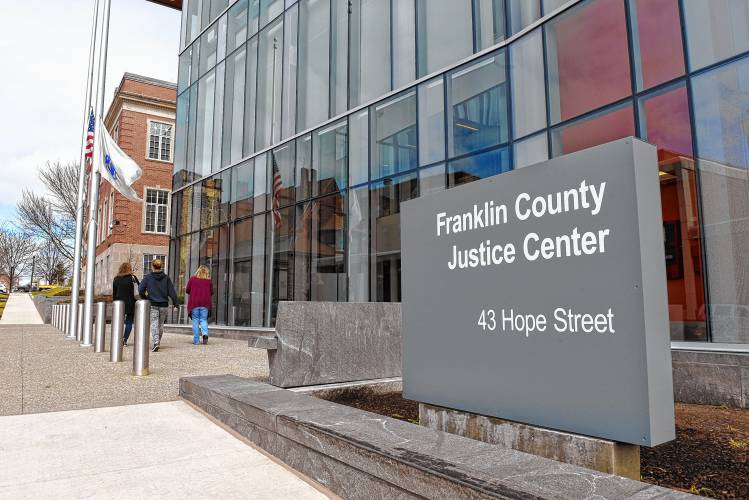Early success in Greenfield prompts statewide launch of Family Treatment Court
Early success in Greenfield prompts statewide launch of Family Treatment Court The Recorder



The Franklin County Justice Center on Hope Street in Greenfield.
STAFF FILE PHOTO
Early success in Greenfield prompts statewide launch of Family Treatment Court
Introduction
Early success in Greenfield Juvenile Court has spawned a statewide launch of Family Treatment Court sessions to address the needs of families involved in Juvenile Court cases in which substance use is a contributing factor.
Background
PATHS (Prevention and Treatment for the Health and Safety of Children and Families) Family Treatment Courts are non-adversarial, collaborative court sessions working with child protective services, substance use and mental health treatment professionals, and community partners to coordinate services to ensure children have safe, nurturing and permanent homes and that parents/guardians achieve stable recovery from drug abuse. Judge Beth Crawford, then a Franklin Probate and Family Court judge, founded the Greenfield session in her courtroom in 2016 before a $2.1 million federal grant enabled an expansion to Juvenile Court the following year.
“I think we were very lucky to start out in Greenfield,” she said. “I think Greenfield was really the perfect place.”
Statewide Launch
The statewide launch started in December, with a PATHS Family Treatment Court opening in Hampden County Juvenile Court in Springfield. The expansion was made possible by a $1.5 million grant from the federal Office of Juvenile Justice and Delinquency Prevention to develop and implement family treatment courts across the state. Crawford said the next locations will be Fall River and Lawrence. The Trial Court also provides additional funding.
Kathleen Sandman is now the Treatment Court’s presiding judge, having replaced Crawford when the latter retired in 2021. She said she has seen the court’s benefits with her own eyes.
“There are many,” she said. “The obvious [one] is people are able to reunify with their children.”
Impact and Benefits
Crawford explained this program started as an idea in the early 1990s when attorneys Diane Esser and Tom Merrigan were asked to joined the Supreme Judicial Court’s task force to examine alternative ways to handle these wrenching issues.
According to information from the state Supreme Judicial Court’s public information office, research cited by the California-based Center for Children and Family Futures shows that family treatment courts assist parents in entering treatment more quickly, staying in treatment longer, and completing treatment at higher rates when compared with conventional child welfare and dependency court interventions. They also increase the likelihood of reunification of children and parents with no effect on the risk of repeat maltreatment or reentry into the child welfare system and reduce the amount of time children spend in out-of-home care. There are reportedly at least 60 specialty court sessions in Massachusetts focused on issues like substance use disorders, mental health conditions, veterans issues, and family recovery and dispute resolution.
“I have nothing but the best of hope,” Sandman said. “The need, unfortunately, is up.”
Statewide Launch Event
The Massachusetts Trial Court marked the statewide launch of Family Treatment Court sessions on March 13 with an event at the John Adams Courthouse in Boston. Speakers included Trial Court Chief Justice Heidi Brieger, Trial Court Administrator Thomas Ambrosino, Juvenile Court Chief Justice Amy Nechtem, and Alexis Balkey, program manager for the Center for Children and Family Futures, the national training and technical assistance provider for family treatment courts. A short video created by staff and graduates of Franklin County’s Family Treatment Court was presented.
“Families across the commonwealth will benefit from the opening of Family Treatment Courts in the Juvenile Court,” Brieger said. “These programs use a collaborative approach to address the needs of parents with substance use disorders, as well as to protect their children throughout the Care and Protection process.”
Contact Information
Reach Domenic Poli at: dpoli@recorder.com or 413-930-4120.
SDGs, Targets, and Indicators
| SDGs | Targets | Indicators |
|---|---|---|
| SDG 3: Good Health and Well-being | Target 3.5: Strengthen the prevention and treatment of substance abuse, including narcotic drug abuse and harmful use of alcohol | No specific indicators mentioned in the article |
| SDG 4: Quality Education | Target 4.7: By 2030, ensure that all learners acquire the knowledge and skills needed to promote sustainable development, including among others through education for sustainable development and sustainable lifestyles, human rights, gender equality, promotion of a culture of peace and non-violence, global citizenship and appreciation of cultural diversity and of culture’s contribution to sustainable development | No specific indicators mentioned in the article |
| SDG 5: Gender Equality | Target 5.1: End all forms of discrimination against all women and girls everywhere | No specific indicators mentioned in the article |
| SDG 10: Reduced Inequalities | Target 10.2: By 2030, empower and promote the social, economic and political inclusion of all, irrespective of age, sex, disability, race, ethnicity, origin, religion or economic or other status | No specific indicators mentioned in the article |
| SDG 16: Peace, Justice and Strong Institutions | Target 16.3: Promote the rule of law at the national and international levels and ensure equal access to justice for all | No specific indicators mentioned in the article |
Behold! This splendid article springs forth from the wellspring of knowledge, shaped by a wondrous proprietary AI technology that delved into a vast ocean of data, illuminating the path towards the Sustainable Development Goals. Remember that all rights are reserved by SDG Investors LLC, empowering us to champion progress together.
Source: recorder.com

Join us, as fellow seekers of change, on a transformative journey at https://sdgtalks.ai/welcome, where you can become a member and actively contribute to shaping a brighter future.








